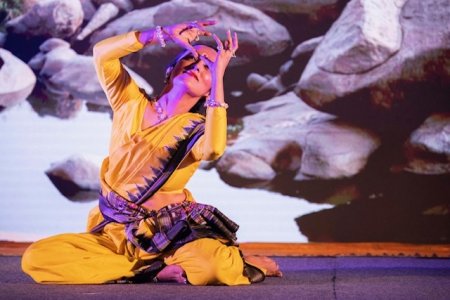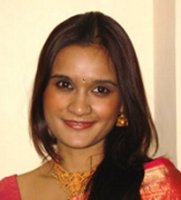
|
 |

|
 |
Reading 'The Poetic Saree' - Rashika Ojha e-mail: rashikalib@gmail.com September 14, 2020 While meditating, the mind takes a plunge inwards from the laughter of the outside to the silence of the inside. Treading this journey is like going through a catharsis of emotions but what happens when the inner self is constantly talking to you... then there is just dialogue. When Jaya Mehta talks with her inner self, she 'spills' over 'melody' of poetry and gives birth to a new idea or genre of poetry, 'Dance Poetry' as beautifully described by the renowned poet, playwright and philosopher Dr. H.S. Shivaprakash in praise of the book 'The Poetic Saree.'  I am fortunate to have known the poetess for sometime and this has helped me understand her route of philosophy. Jaya Mehta is an artiste, writer, dancer and a dance educator. She has imbibed the Guru Surendranath Jena style of Odissi from her Guru Pratibha Jena. In these virtual times, Jaya and I dressed up in the attire we celebrate today, a saree, talked online on her most recent array of creative work 'The Poetic Saree' published by Notion Press. When Jaya talks about 'The Poetic Saree', her heart fills with love, mind ecstatic and body exuberant because it's her dance that lives through her book. You need extraordinary engagement to see the world so simply yet deeply philosophical. After reading her poetry I feel like I am watching the world from a mountain top and I feel one with the entire being. Here I share our dialogue.... Why did you choose 'saree' as a metaphor in your work of poetry? There are two reasons why saree runs through my work. First, this is dance poetry and it comes from dance experience. Secondly, Odissi is a mother of this experience and the experience is the same like we drape a saree around our body, it takes effort and understanding. I depict this intimate relationship that a saree shares with the body, as a metaphor to the relationship I share with my dance. When did you start writing poetry? I was always writing poetry. I started writing formally in my adult life and only after my dance experience. Through the dance experience, words just started coming to me and I kept writing. I am sure all pieces are special, yet I wish to know the one that is closest to your heart. I would say that the piece 'Return' resonates most with me. It's just the way nature works; it's a realization of the natural processes and also celebrating the same.  Jaya Mehta "Some of me spills over And a new melody begins..." These two beautiful lines ring in my mind, but what did you mean? Poetry is a subtle way of experiencing life. And a saree heightens your senses. They both enable you to explore the spaces in-between. Sculptures have a negative space or empty space between the legs. This empty space, shaped by the stance of legs also takes many forms like a diamond, triangle, 4 sided geometrical shapes... It is as important as the form and lines created by the dancer's body. Like the meaning between the lines, not only the literal meaning of the words of a writer. The Odissi saree in a single, draped avataar, is that unbroken form that helps us see everything the dancer creates, the many shapes created by her around her body and legs. In the poems, there is a constant reference to the duality within the self... how do you answer this duality? The answer to this duality is through the piece 'This Married-ness', the journey and then the union with the deepest self. The most honest acceptance of our self and the celebration of the same, in the readiness of love and in abundance of the self. Poetry was inspired by your dance processes but what about performance? How did the performance of these poems happen? To begin with, I had never thought of presenting them in dance but 'Sakhi' happened accidentally where I performed with the Kathak artiste Anima Jhagroe-Ruissen for the International Poetry Festival in Rotterdam. Anima completely understood the subtleness of the poems. The energy that the presentation of 'Sakhi' generated led me to work on the other poems. I also performed the poem 'Sculpturesque' for the Indian Dance Festival in Hague. The performances led me to start thinking of putting these pieces of poetry together. The idea of the book happened with these performances. Jaya, it's like taking a full circle and coming back to where one started. Even the structure of your book looks in the same framework. Is it because you look for a closure? The book reads 3 themes of dance: Art, Nature and Emotions. The beginning of the book is with the poem Poetry River, and it takes you to the riverine, fluid, elusive nature of poetry. I kept the Emotions as the last section, as they are more visceral or more abstract. Also, the last poem is Return, my favourite poem because it is in the spirit of bhakti poetry and is deeply philosophical. Essentially, life is to be led with a philosophy. Dance and poetry has solidified my poetic as well as philosophical way of leading my life. So, would you call your genre as bhakti poetry? Yes, I think of my poetry as a kind of bhakti poetry, completely one with the divine energy of the universe. Sometimes palpable in nature, its elements, sometimes in powerful creative energy... Each time it is a dialogue with the Self, in all its forms. 'The Poetic Saree' is a body of 23 poems divided into three parts of how Jaya looks and observes life as art, nature and emotions. These 'ways of seeing' as John Berger titles his book on perspective have branched, broken and blossomed into... My boulder being fragments, pebbles gurgles, cascades In the poetic river (The Poetry River, The Poetic Saree)  Rashika Ojha Abrol is a Bharatanatyam exponent trained under Guru Saroja Vaidyanathan. She has her Bachelors in English Literature, Hindu College and Masters in Arts and Aesthetics, JNU. Rashika is interested in research on all kinds of arts especially performing arts. She is a freelance writer. Post your comments Please provide your name and email id when you use the Anonymous profile in the blog to post a comment. All appropriate comments posted with name and email id in the blog will also be featured in the site. |